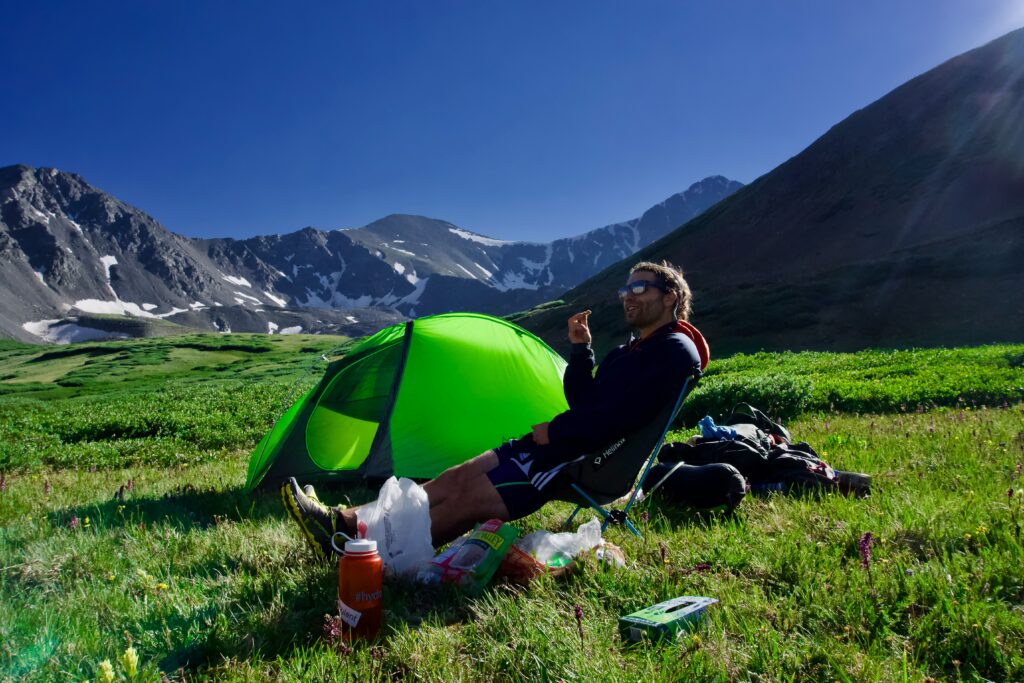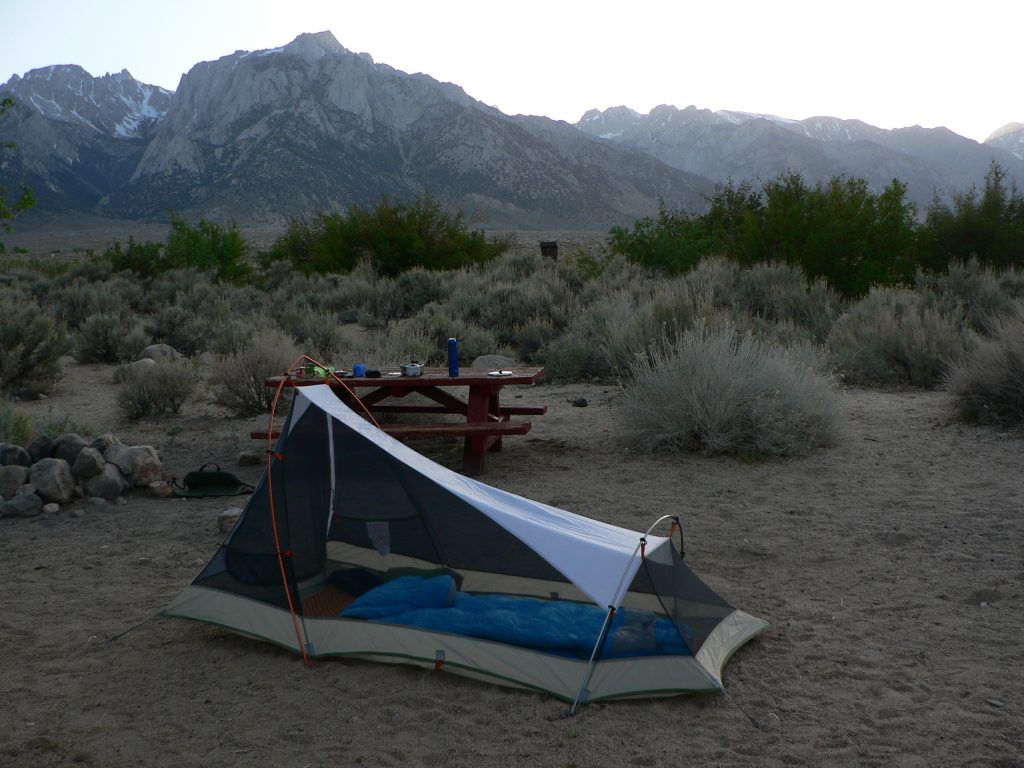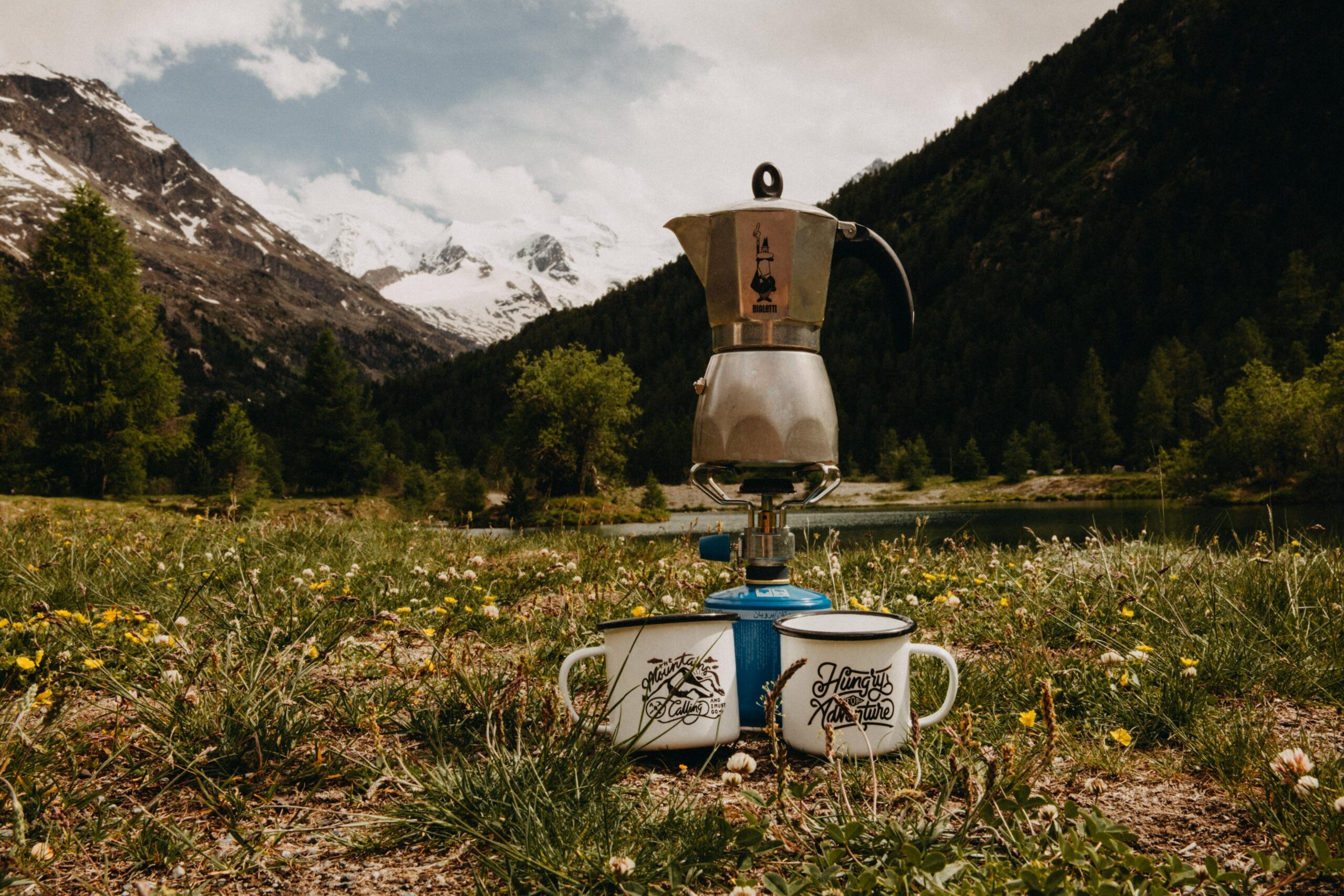Below we’ll cover a few essential tips for first-time campers, applicable to all destinations and seasons. Whether you’re heading to a popular campground or venturing into the wilderness for the first time, there are a few common things to be aware of when planning a camping trip. Here’s our advice to ensure you enjoy your first camping experience to the fullest and your trip goes smoothly.

Tip 1: Make a Packing List
I know this sounds daunting if you’re not a planner. But if this is going to be your first camping experience, you should really try to use this advice and create a checklist of everything you need to pack. Being organized is key to a stress-free camping trip. Trust me, you don’t want to drive five hours away from civilization only to realize you forgot sunscreen or another essential item. You can use this checklist for car camping and this one for backpacking to get started, but you should personalize the items to your needs.
I also recommend that you keep your things organized in the car and at camp. Use bins or storage bags to separate items like camp gear, clothes, cooking equipment, toiletries, and food. Especially when camping in areas where wildlife is common, which is basically everywhere, keeping your food separate from everything else makes it quicker and easier to store it overnight according to local regulations.
Tip 2: Invest in the Right Gear
Having the right camping gear can make all the difference in your enjoyment of camping. While you don’t need to spend a fortune on high-end equipment, you should prioritize a good sleeping bag, sleeping pad, and tent.
Sleeping Bag: A comfortable sleeping bag – appropriate for the temperature you’ll encounter – is essential. One thing all novice campers must know is that the “Temperature Rating” of a sleeping bag is the lowest temperature you can camp before getting hypothermic. When looking for sleeping bags, always ask about the “Comfort Rating” of the bag rather than the “Temperature Rating”. After all, you want to enjoy your experience, especially if you’re a first-time camper!
Sleeping Pad: Do NOT sleep directly on the ground! I guarantee that it will make for a miserable night. The purpose of a sleeping pad, aside from added comfort, is to insulate you from the ground and thus help regulate your body temperature when you sleep. For this reason, I recommend a sleeping pad that’s insulated at R-Value 4 and above. The higher the rating, the warmer and cozier it will be.
Tent: Choose a tent that suits the weather forecast and type of camping you’re planning. A family who sets up camp next to the car in rainy weather will need a very different tent from a couple of backpackers with no rain in the forecast. Whatever tent you choose, make sure it has good ventilation and comes with a removable rainfly. Remove the rainfly if it’s warm and you want to see the stars, then put it on for extra warmth before it gets too cold at night.

Tip 3: Choose the Right Campground
Staying at an appropriate campground can make or break your trip! Whether you’re camping in a private campground, a national park, a state park, or a backcountry site, know what amenities to expect, if any, before you go. As a general rule, the less amenities a campground offers, the easier it is to connect to nature. For example, backcountry sites will only have cleared flat areas for tents and maybe a pit toilet.
To make your trip more comfortable and reduce stress about logistics, you could look for a campground that offers basic facilities such as flush toilets, potable water, and trash disposal. Whatever campground you choose, check if it accepts reservations and book it. Assuming this is your first time camping, you don’t want any surprises!
By the way, depending where you go, you could also find campgrounds with showers and WiFi. If that’s your preference, choose your campground like you would a hotel room. Keep in mind that you might not get the hardcore camping experience you have in mind this way, and you’ll have to drive farther to your destinations during the day.
Tip 4: Choose the Right Campsite
The campsite you choose in a campground is also extremely important. First of all, I recommend choosing a space close to water/toilet facilities, if applicable, but not so close that other campers walk through your site. Next, look for a flat, dry spot to set up your tent. Avoid areas prone to flooding (like a wash or dry river bed) or areas near cliffs where rockfall could occur. Also be aware of wind direction and tree branches that seem like they could fall. For this reason, choosing the right location to pitch a tent is crucial!
Tip 5: Practice Setting Up Your Tent
One of the biggest challenges for novice campers is setting up camp, especially the tent. A wet, dark night or strong winds can make it frustrating if you’re not prepared. To avoid this, practice setting up your tent at home before you leave for your trip. Familiarize yourself with all the different parts of the tent, which you may or may not use depending on the weather at your campsite.
Tip 6: Plan Your Meals
One of the highlights of camping is cooking and eating outdoors, but it requires some planning because you’ll need to buy ingredients in advance. For first-time campers, I would say that simple and easy-to-prepare meals are the way to go. Instant oatmeal for breakfast, pasta and bagged chicken for dinner, trail mix and granola bars as snacks, are just some examples. Plan your menu for the entire trip to see if you need to buy everything in advance or if there are grocery stores to stock up along your journey.
Remember to bring trash bags and keep your campsite clean to avoid attracting animals. If you’re camping in the backcountry, you’ll need to pack out all your trash and carry it with you until you return to civilization.

Tip 7: Keep Safety in Mind
Safety is an essential part of any camping trip. As a novice camper, it’s important to be aware of your surroundings and take precautions to avoid accidents or emergencies. Research any local hazards, like wildlife (bears, snakes) or dangerous plants (poison ivy). Bring a basic first aid kit with items like bandages, antiseptic wipes, pain relievers, and tweezers for splinters or ticks. Most importantly, before heading out, share your itinerary and expected return time with a friend or family member.
Tip 8: Embrace the Elements
Camping is about connecting with nature, which means you might encounter some less-than-ideal weather conditions. Instead of letting rain or wind ruin your trip, embrace the experience. Many first-time campers are caught off guard by weather changes. For example, though summer camping is ideal for beginners, you should prepare for cold nights or even rain. Always check the forecast before leaving and plan accordingly, but also prepare for the weather to change unexpectedly. Bring a waterproof jacket, extra layers, and rain covers for your gear in case the weather turns. Camping is about accepting the challenges that nature throws your way, and often those challenges lead to the most memorable experiences.
Conclusion
Camping is about enjoying the outdoors and disconnecting from everyday stress. Whether it’s the beauty of the sunrise, the quiet of the forest, or the fun of telling stories around the campfire, it’s nice to take time to appreciate the environment around you. Things might not always go according to plan, and that’s ok. Camping is about adapting and enjoying the simplicity of life outdoors. If you can, put away your phone and electronic devices. Immerse yourself in the experience and enjoy the company of friends, family, or even some solo reflection. I hope that you put the above tips for first-time campers to use and have a wonderful time on your trip!
